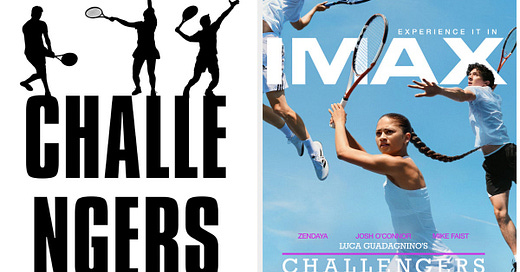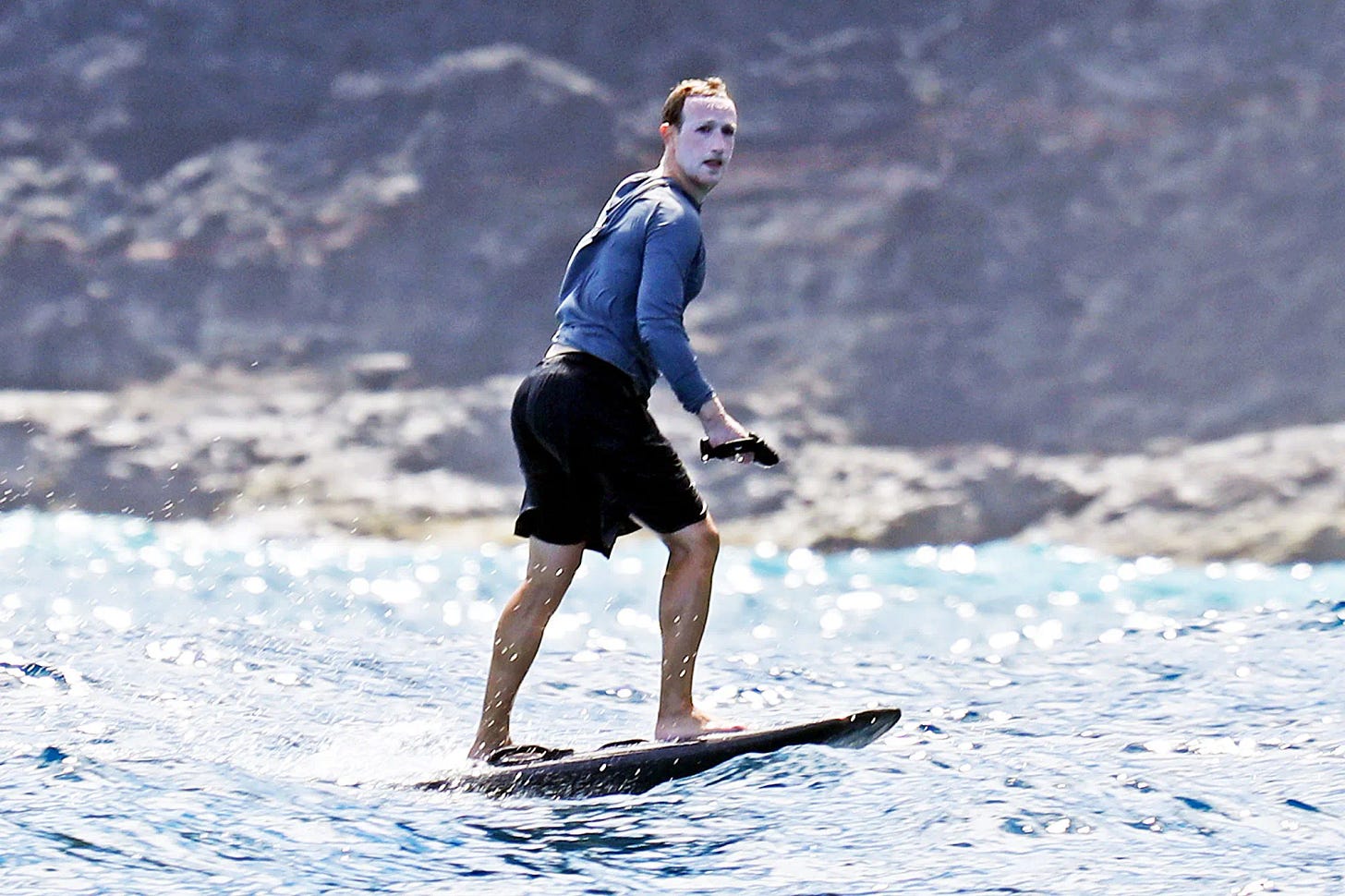WEEKLY RECAP #53: "Challengers" Poster Controversy, New Aaron Sorkin Project & MORE!
4/21/24 -- 4/27/24
Graphic Design is My Passion
With the exception of Dune: Part Two, 2024 has been a limp year so far for movies with major cultural impact. (Unless, of course, you also count Godzilla x Kong: The New Empire, which is technically a box office hit, but also has had negative cultural impact.) We’re rapidly approaching May, and up to this point, this year is shaping up to have a similar box office record to the tumultuous 2023. But wait — HOLD THE FORT! There’s a new movie out in theaters right now that’s become a huge conversation starter: Challengers, an original R-rated film about a love triangle between tennis players (the trailer for which I covered when it dropped last summer). It’s directed by Luca Guadagnino, and it’s shaping up to be his biggest movie yet — it holds a budget of $55 million, and in just its first weekend, it's tracking up to earn $15 million, which was the total gross of his last movie, Bones and All. In addition to having clear star power in the leading trio of Zendaya, Mike Faist and Josh O’Connor, Challengers also has received rave reviews, with people praising the script, the performances, the house-inspired musical score from Trent Reznor & Atticus Ross, and the intense, sexy energy of the film.
It’s great to see everyone talking about a true cinematic banger — something that actually infuses life into the box office and gets young people to go to the theater — but there’s a small development around this film that I couldn’t not mention this week. Any long-time readers of these recaps know full well by now that I am obsessed with movie marketing blunders, and boy oh BOY did we have one this week. A fan-made poster for Challengers released by @filmstofilms_, a Twitter account with a sizeable following, made the rounds this week. Why? Well, for one, it looks like shit. I’M SORRY TO WHOEVER DESIGNED IT, but, like, c’mon… when compared to the simple brilliance of Zendaya’s glasses reflecting the two boys playing tennis on the official poster, a white poster with black text and generic silhouettes just ain’t cutting it! None of this is even to mention the fact that the title for the movie on this unofficial poster is split in half, with “CHALLE” above “NGERS”, and you can probably guess that having the letters N-G-E-R-S isolated together might’ve peeved some people.
I’m sure that @filmstofilms_ didn’t mean to accidentally put what looks like the N-word on their poster, but they got eaten alive for it regardless. This train wreck of a poster even garnered the attention of the official Challengers Twitter account, which set the record straight on Friday with a tweet of Challengers’s main poster and IMAX poster, along with the message “Happy Challengers Day from our only official posters.” I guess the lesson to be learned here is that designing movie posters is harder than it looks. Also, that you shouldn’t make an advertisement with a racial slur on it. Take notes, people — this will be on the exam.
Meta Narrative
The Social Network is one of the most acclaimed movies of the twenty-first century. It is endlessly quotable, considered by many to be David Fincher’s best movie, and —fun fact — is Quentin Tarantino’s favorite movie of the 2010s. (Not surprising, given his affinity for intricate, overly-theatrical dialogue.) Many people have been speculating for years if there would ever be a sequel, since The Social Network followed Mark Zuckerberg’s rise to becoming the king of Facebook, and there have certainly been more than a few major developments in the influence of the Meta corporation since 2010. If any of those speculators are reading this, you’re in luck: it seems like we’re finally getting the Facebook sequel we’ve always wanted! Well, sort of.
Aaron Sorkin, the Oscar-wining screenwriter who wrote The Social Network, is reportedly planning to write a movie about how Facebook and social media have influenced democracy in the years since his 2010 hit. The quote that people are hanging onto is when Sorkin said during this episode of The Town podcast: “I blame Facebook for January 6,” and implied that his reasoning for this claim will be evident in the movie once it gets made. Now, is this screenplay going to specifically be about the January 6th Capitol riots? it’s not 100% confirmed, but given what Sorkin said and that he was previously working on a Jan. 6th script that didn’t end up moving forward, a lot of news outlets are speculating that they might be connected. Whatever this new screenplay is, it’s being described as less of a direct sequel to The Social Network than Social Network-adjacent (that’s boring speak for “spiritual predecessor”), so if you’re looking forward to watching Jesse Eisenberg recreate videos of the Zucc shouting out Sweet Baby Ray’s barbecue sauce, I wouldn’t hold your breath.
First of all, let me be clear: unless this sequel is also directed by David Fincher, I could care less about it. Second of all… listen, I love Sorkin’s script for The Social Network, and the dude is undeniably talented, but if this movie is going to be about January 6th in any capacity, I can’t say I’m anything more than cautiously optimistic. The thing about Sorkin is that he has a knack for heavily romanticizing leadership and the idealized vision of changing the world through honoring freedom and the laws of the United States. (In other words, he’s polishing Uncle Sam’s knob on a daily basis.) It kinda works for some movies, but feels corny and reductive in others. The simple reason for this is that is that, sometimes, the United States is fucking stupid, and our democratic leadership is directly responsible for terrible things happening — overseas and domestically. As someone who lived through January 6th, I sincerely believe that the best possible movie that could be made about it would be a full-blown comedy. I’m sorry but the fact that a bunch of diabetic Qanon chuds stormed the Capitol building just to take pictures in Nancy Pelosi’s office and then immediately get sent to prison for twenty years is fucking hilarious! It was one of the greatest days of television ever, and I don’t expect a guy who is constantly stroking the rolled-up US constitution to see an objectively hysterical moment in history like that through a satirical lens.
Sorry folks — I try not to delve too much into politics in this series, but if it affects the quality of art and the film industry as a whole, it can’t be avoided. Back to your regularly scheduled programming!
(Non) Risky Business
There’s a brilliant scene in the show Barry where the character Sally finds out that her well-reviewed TV show is being canceled after only twelve hours, because the algorithm that controls her network deemed it cancellable due to not hitting enough “taste clusters” and other comically absurd requirements. The scene is clearly riffing on the tendency that streaming companies have to cancel seasons of television with cult followings before they have time to find their audience. What’s unfortunate is that, as Hollywood grows more and more risk averse, stuff like this is becoming more and more common. A new piece from The Hollywood Reporter this week broke down in brutal detail how difficult it is to land in “director’s jail,” a term that refers to when directors are shut out of the film industry for losing studios too much money. Damien Chazelle is stuck in that box right now, as I’ve recently covered, but he’s far from the only promising talent in that position. This growing trend is one of many side effects that have resulted from the inhospitable post-COVID market conditions of the film industry. As the article explains:
Fewer films are being made, from big-budget movies ($120 million-plus tentpoles) to even fewer midbudget offerings ($45 million to $60 million plus), which traditionally gave filmmakers more opportunities for financial success. Those features that are being greenlit, especially IP-driven ones, are being micromanaged by exceedingly risk-averse studio executives who are still trying to navigate how to release a film post-pandemic while making hiring decisions amid belt tightening and staggered layoffs that have netted shifting management teams.
In a nutshell, new up and coming directors don’t just have to make a good indie movie with minimal slip-ups to be entrusted with a larger budget — they have to make three good movies with zero slip-ups before they’re even considered. And, even when they get their big shot, get this: a single dour score on Rotten Tomatoes (yes, the site that gamifies critical reception and was literally exposed last year for being regularly susceptible to bribes) can immediately send you tumbling back down the ladder. It takes a while for a director’s skill to develop and ultimately flourish, and a main part of that process is working past mistakes and taking on gradually larger budgets throughout the years… but in 2024, you must be perfect (and, preferably, already established) to be given a fraction of a fair shot.
I won’t lie to you guys: this situation is pretty bleak. While it is cringe to play Devil’s Advocate for studio executives, you can’t really blame any of them for being scared to place their investments in the hands of newcomers when the movie business has taken such a vicious beating for the first half of this decade. Pretty much everybody lost money last year — Barbie is the only reason Warner Bros. wasn’t ranked dead last — and as easily as it would be to develop a stubborn Writer’s Strike-type attitude of flipping off the execs and demanding what we want… it’s not that simple. While, yes, the astronomically high standards for young filmmakers is due in part to rejections from higher-ups, it’s also the fault of broader dynamics in the distribution environment, and certain factors like streaming (and, yes, Rotten Tomatoes) have irrevocably complicated the landscape even further. As someone looking to enter the film industry after college, there’s not much I can do besides hope for some major shift in the coming years that causes the pendulum to swing back into the Fun Flirty Zone, as opposed to the Evil Fucked-Up Zone it’s currently in. Let’s all pray that the orangutan corpse-powered generators that run the AI servers jam soon and can’t make things even worse.







Clearly, there was minimal budget $ spent on the poster design for Challengers…oh well.
I think it would be great to follow up The Social Network with some kind of sequel. Facebook has been in our lives for around 15 years and much has changed and/or been influenced by its presence. There’s so much material there to craft a sequel. Great substack!
I can't wait to see Challenger! Great substack!